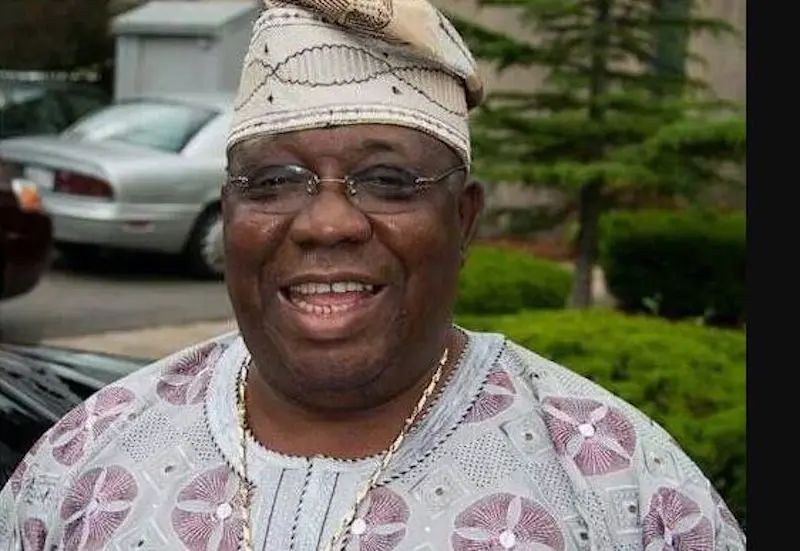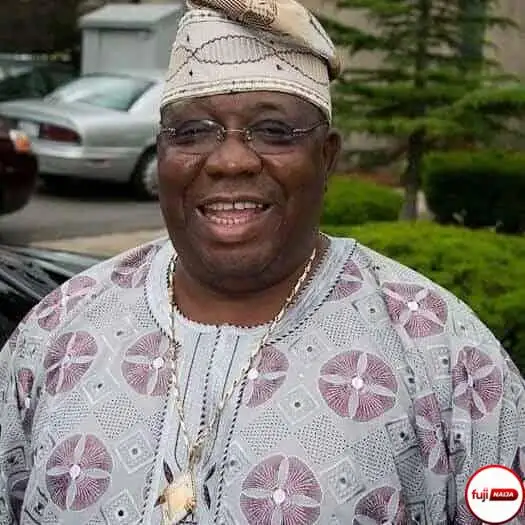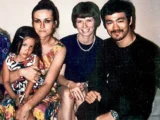
Ayinde Barrister Biography: Age, Parents, Wife, Children, Net Worth, Albums, Songs, Death
0 Posted By Kaptain KushBiography
Sikiru Ololade Ayinde Balogun (February 9, 1948 – December 16, 2010), known professionally as Ayinde Barrister, was a pioneering Nigerian Yoruba singer-songwriter, performer, and producer.
He is widely regarded as the “King of Fuji” for revolutionizing the genre by blending traditional styles, such as apala, sakara, and awurebe, with modern elements.
Trending Now!!:
- Bizarrap Biography: Age, Wife, Children, Net Worth, Height, Parents, Albums, Songs, Awards
- Andra (singer) Biography: Husband, Age, Children, Net Worth, Parents, Height
- Opa6ix Biography: Net Worth, Age, Wife, Children, House, Cars, Real Name, Family
- Aaliyah Biography: Age, Husband, Songs, Net Worth, Cause of Death, Children, Albums, Height, Parents
- Vanessa Carlton Biography: Husband, Age, Parents, Net Worth, Kids, Height, Songs, Albums
Born in Ibadan to a butcher father and a trader mother, he began his musical journey as a young ajiwere singer during Ramadan, honing a complex Yoruba vocal style by the age of ten.
After receiving early education in Lagos and attending Yaba Polytechnic, he worked as a typist at Nigerian Breweries and served as a clerk in the Nigerian Army during the Nigerian Civil War.
Barrister released his debut LP in 1966 under African Songs Ltd, later founding Siky-Oluyole Records, and produced over 70 albums, including hits like Iwa (1982), Nigeria (1983), and Fuji Garbage (1988). His music emphasized Yoruba values of good behavior and respect for elders, gaining widespread acceptance across religious lines by the 1980s.
Awarded the Member of the Order of the Federal Republic (MFR), he mentored stars like King Wasiu Ayinde Marshall (KWAM 1) and performed internationally until his death from congestive heart failure.
| Nigerian singer-songwriter | |
| Ayinde Barrister | |
|---|---|
 | |
| Wiki Facts & About Data | |
| Real Name: | Sikiru Ololade Ayinde Balogun |
| Stage Name: | Ayinde Barrister |
| Born: | 9 February 1948 (age 62 years old) |
| Place of Birth: | Ayeye, Ibadan, Nigeria |
| Died: | 16 December 2010 (age 62 years), St Mary’s Hospital, London, United Kingdom |
| State Of Origin: | Oyo State |
| Nationality: | Nigerian |
| Education: | Muslim Mission School, Model School in Mushin, Yaba Polytechnic |
| Height: | N/A |
| Parents: | Salawu Balogun, Hajia Shifawu Odee Subuola |
| Siblings: | Alhaji Nurudeen Balogun |
| Spouse: | Yetunde Balogun (m. ?-2010), Bola Balogun (m. ?-2010), Bisi Balogun (m. ?-2010), Olayinka Balogun (m. ?-2010), Kehinde Balogun (m. ?-2010), Yemi Balogun (m. ?-2010), Mejidat Balogun (m. ?-2010), Faderera Balogun (m. ?-2010), Alhaja Morufat Balogun (m. ?-2010), Aisha Balogun (m. ?-2010), Balogun Balogun (m. ?-2010), Alhaja Maimunat Balogun (m. ?-2010) |
| Girlfriend • Partner: | Not Dating |
| Children: | Barry Jhay, Barry Showkey, Adewale Akanji Balogun, Modinat Ayeloja, Adebola Balogun, Agbeke Balogun, Damilola Balogun, Aminat Balogun, Adefemi Adekanye Balogun, Qudus Balogun, Kuburat Abiola, Abayomi Balogun, Babajide Balogun |
| Occupation: | Musician • Record Producer |
| Net Worth: | $100 million-$200 million (USD) |
Early Life & Education
Sikiru Ololade Ayinde Balogun, professionally known as Ayinde Barrister, was born on February 9, 1948, in the Ayeye area of Ibadan, Nigeria, into a Yoruba family.
His ethnicity was Yoruba, and he practiced Islam, as evidenced by his early involvement in religious music traditions, such as ajiwere singing during Ramadan, which incorporated Islamic chants and praise songs.
Barrister‘s father, Salawu Balogun, was a butcher and trader who also had musical talents in Ibadan, but passed away in 1968 when Barrister was around 20 years old.
His mother, Hajia Shifawu Odee Subuola (also referred to as Alhaja Shifau Odee Oshodi in some accounts), was a trader who supported the family after his father’s death until her own passing in 2001.
He had at least one immediate younger brother, Alhaji Nurudeen Balogun, who was also involved in Fuji music and spoke fondly of Barrister‘s role in his upbringing and training after their father’s death.
Barrister‘s early life was marked by modest beginnings in Ibadan before the family moved to Lagos. He began developing his musical skills as a child, mastering complex Yoruba vocal styles by age 10 and performing as an ajiwere singer to entertain Muslim communities during fasting periods.
For education, he attended the Muslim Mission School for his primary studies, followed by the Model School in Mushin, Lagos.
However, he was unable to complete his secondary education due to financial hardships following his father’s death; his mother’s efforts as a petty trader were insufficient to sustain his schooling.
Later, Barrister pursued practical skills by studying typing and other commercial courses at Yaba Polytechnic in Lagos, which helped him secure early jobs as a typist before his music career took off.
These formative years, blending cultural traditions, family responsibilities, and limited formal education, laid the foundation for his pioneering role in Fuji music.
Career
Sikiru Ololade Ayinde Balogun, famously known as Ayinde Barrister, was a legendary Nigerian musician credited with creating and popularizing the Fuji music genre. Celebrated as the “King of Fuji,” he transformed Yoruba traditional sounds into a dynamic, globally recognized art form.
Barrister’s musical journey began in the early 1960s as an ajiwere singer during Ramadan in Lagos, captivating Muslim communities with his powerful Yoruba vocals. By 1966, at just 18 years old, he released his debut LP under African Songs Ltd, officially entering the professional music scene.
He pioneered Fuji music—a genre he named after Mount Fuji in Japan—by fusing Yoruba styles such as apala, sakara, and awurebe with modern influences like juju and highlife.
Incorporating instruments including the talking drum, sakara drum, guitars, and keyboards, Barrister crafted a sound that was not only entertaining but also deeply rooted in Yoruba values of respect, discipline, and cultural pride. By the 1980s, Fuji had grown into a mainstream genre that resonated far beyond religious boundaries.
During the Nigerian Civil War (1967–1970), Barrister served as a clerk in the Nigerian Army, where he founded the Fuji Carriers Band, performing for both soldiers and civilians. After the war, he briefly worked as a typist at Nigerian Breweries before dedicating himself fully to music. In the 1970s, he founded Siky-Oluyole Records, producing a vast catalog of hit songs.
Over his prolific career, Barrister released more than 70 albums, including classics such as Iwa (1982), Nigeria (1983), Fuji Garbage (1988), and Fuji Exponent (1990). His music often carried sharp social commentary, addressing political, cultural, and moral issues, which earned him immense respect and a loyal fanbase both in Nigeria and abroad.
Known for his energetic live performances, Barrister’s shows featured large ensembles of drummers, guitarists, and vocalists. He toured widely across Europe, the United States, and beyond, spreading Fuji’s influence to international audiences. He also mentored future stars, most notably King Wasiu Ayinde Marshall (KWAM 1), ensuring the continuity of Fuji music for future generations.
In recognition of his cultural contributions, he was honored with the Member of the Order of the Federal Republic (MFR). Barrister remained musically active until his health declined, passing away on December 16, 2010, from congestive heart failure.
Today, Ayinde Barrister’s legacy lives on as the founder and foremost ambassador of Fuji music, a genre that remains central to Nigeria’s cultural identity and continues to inspire artists across Africa and the diaspora.
Personal Life
Sikiru Ololade Ayinde Balogun, known as Ayinde Barrister, was born on February 9, 1948, and passed away on December 16, 2010, at the age of 62 from congestive heart failure.
As a devout Muslim and Yoruba cultural figure, Barrister practiced polygamy, which was common in his community, leading to multiple marriages over his lifetime.
He reportedly had 16 wives, with some living in his Fuji Chambers mansion in Isolo, Lagos, while others resided elsewhere in Nigeria or abroad.
Known wives included Yetunde Ayinde, Bola Ayinde, Bisi Ayinde, Olayinka Ayinde, Kehinde Ayinde, Yemi Ayinde, Mejidat Ayinde, Faderera Ayinde, Alhaja Morufat Ayinde, Aisha Ayinde, and Balogun Ayinde, among others; his most beloved was the late Alhaja Maimunat Balogun, whom he honored by naming a mosque in his home after her.
One marriage was controversial—the union with the daughter of his close friend Adisa Pele (referred to as “Pele‘s youngest daughter”), which he defended in a song by drawing parallels to historical Islamic practices during the time of Prophet Muhammad.
Following his death, several of his widows expressed openness to remarriage after over a decade of widowhood, focusing on their roles as grandmothers and living independently.
Barrister fathered at least 62 children, with some wives having between three and five each. Notable among them are musicians Barry Showkey and Barry Jhay, who have carried on his musical legacy. His other children includes Adewale Akanji Balogun, Modinat Ayeloja, Adebola Balogun, Agbeke Balogun, Damilola Balogun, Aminat Balogun, Adefemi Adekanye Balogun, Qudus Balogun, Kuburat Abiola, Abayomi Balogun, and Babajide Balogun.
His large family reflected his prolific personal life, and many of his children and grandchildren continue to honor his memory through events and performances.
Details on Barrister‘s height are not publicly documented in available sources, so it remains unknown. Similarly, his dating history before or outside of his marriages is scarcely recorded, with no specific accounts of girlfriends or romantic relationships beyond his polygamous unions; public narratives focus primarily on his family life, mentorships in the music industry (such as with K1 De Ultimate and Daddy Showkey), and professional rivalries rather than personal romances.
Net Worth
Sikiru Ololade Ayinde Balogun, known as Ayinde Barrister, was a legendary Nigerian Fuji music pioneer whose financial success stemmed from over 70 album releases, international tours, and his label Siky-Oluyole Records.
However, his exact net worth at the time of his death on December 16, 2010, remains undisclosed and unverified, with no official records available. Some estimates suggest that it ranged from $100 million to $200 million, reflecting his prolific career and large-scale performances; however, these figures appear speculative and are not corroborated by reliable sources.
Other accounts simply state that his net worth is not available. His estate, which includes properties such as Fuji Chambers in Lagos, continues to support his extensive family, comprising 16 wives and over 60 children.
Discography
- Untitled Debut LP (1966) – His first album, released under African Songs Ltd, marking his entry into professional music.
- Iwa (1982) – A significant album showcasing his lyrical depth and social commentary, widely regarded as a classic.
- Nigeria (1983) – A patriotic work addressing national issues, popular for its cultural resonance.
- Fuji Garbage (1988) – Known for its innovative sound and commentary, a landmark in his discography.
- Fuji Exponent (1990) – Highlighted his mastery of Fuji, blending traditional and modern elements.
- Orisun (1975) – An early work reflecting his evolving style and Yoruba cultural themes.
- Okiki Oluwa (1978) – A spiritually inclined album, popular among his religious audience.
- Sibe Sibe (1980) – Noted for its rhythmic innovation and widespread popularity.
- Esin Oba (1981) – Focused on Yoruba values like respect for elders and leadership.
- Aiye (1984) – Addressed societal issues, reinforcing his role as a social commentator.
- Barry Wonder (1985) – A fan favorite, showcasing his versatility and stage charisma.
- Superiority (1987) – Reflected his competitive edge in the Fuji scene, addressing rivalries.
- Fertility (1989) – A culturally significant album with themes of family and legacy.
- Fuji Reggae Series (1992) – Experimented with blending Fuji and reggae influences.
- New Fuji (1995) – Demonstrated his continued innovation in the genre.
- London ’96 (1996) – A live recording from his international performances in London.
- Mr. Fuji (2000) – Cemented his title as the “King of Fuji” with polished production.
NOTICE!! NOTICE!! NOTICE!!
At TheCityCeleb, we strive to provide accurate and up-to-date biographies and entertainment content, focusing on celebrities. Our editorial team researches information from reputable sources, including interviews, official statements, and verified media.If you spot an error or have additional details, please contact us at editor@thecityceleb.com. We value your feedback and are committed to maintaining trustworthy content.




